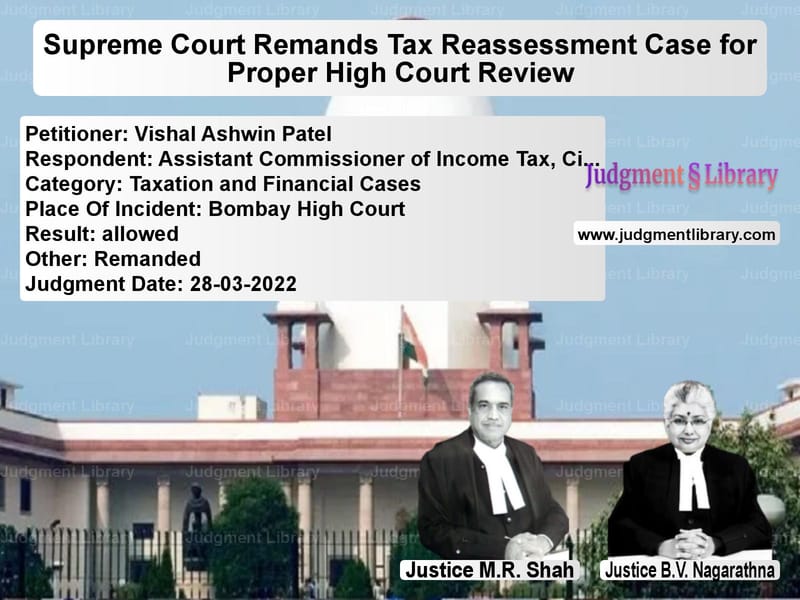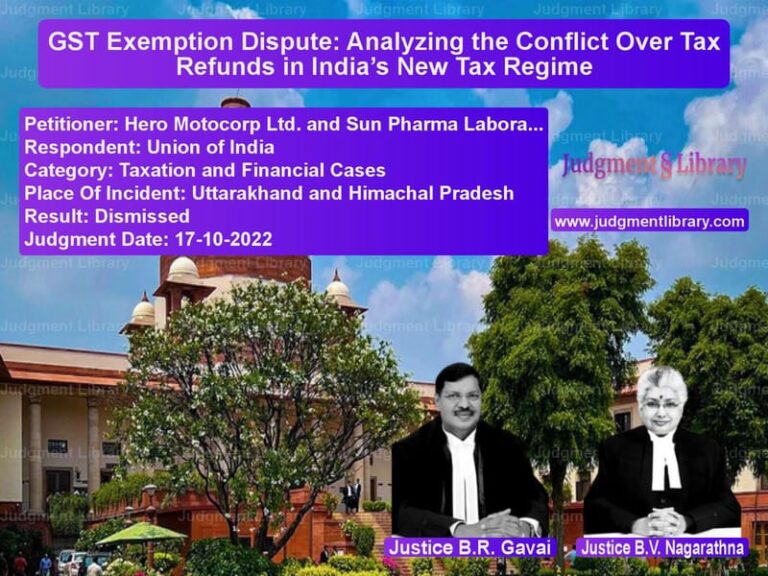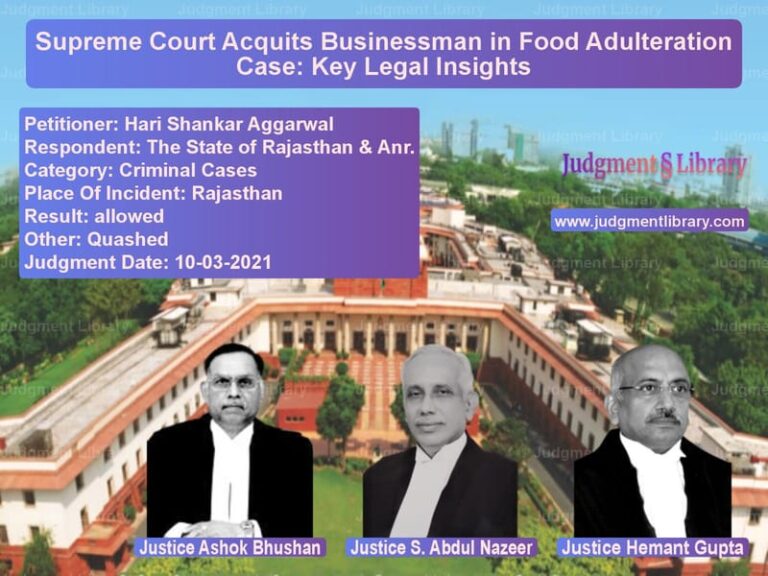Supreme Court Remands Tax Reassessment Case for Proper High Court Review
The Supreme Court of India, in its judgment dated March 28, 2022, ruled on the case of Vishal Ashwin Patel vs. Assistant Commissioner of Income Tax. The case involved a challenge to the reopening of tax assessment proceedings under Section 148 of the Income Tax Act, 1961. The Supreme Court set aside the Bombay High Court’s dismissal of the taxpayer’s writ petition, citing the absence of detailed reasoning in the High Court’s order, and remanded the case for fresh adjudication.
Background of the Case
The appellant, Vishal Ashwin Patel, had filed multiple writ petitions before the Bombay High Court challenging the reopening of his tax assessments for different financial years. The reopening was initiated under Section 148 of the Income Tax Act, which allows the Income Tax Department to reassess income that has allegedly escaped assessment.
The Division Bench of the High Court dismissed the petitions without providing detailed reasoning, stating:
“We are not inclined to entertain this petition.”
However, the High Court directed the Assessing Officer to grant the petitioner an opportunity for a personal hearing before finalizing the reassessment. Dissatisfied with the High Court’s approach, the appellant filed an appeal before the Supreme Court.
Petitioner’s Arguments (Vishal Ashwin Patel)
The petitioner argued:
- The High Court had summarily dismissed the writ petitions without addressing the detailed legal arguments raised against the reopening of assessments.
- The order was cryptic and non-speaking, making it difficult to understand the reasons behind the dismissal.
- The reopening of assessment was not justified under Section 148, and the High Court should have examined the validity of the reassessment notices.
- Since the reopening was challenged on multiple legal grounds, the High Court was required to analyze and rule on each of them in detail.
Respondent’s Arguments (Assistant Commissioner of Income Tax)
The Income Tax Department countered:
- The High Court had already granted the petitioner an opportunity to present his case before the Assessing Officer.
- The taxpayer had the option to submit evidence and challenge the reassessment during the proceedings before the tax authorities.
- The High Court’s decision was within its discretion, and there was no need for interference by the Supreme Court.
Supreme Court’s Observations
The Supreme Court, comprising Justices M.R. Shah and B.V. Nagarathna, ruled in favor of the appellant and remanded the matter to the High Court for fresh adjudication.
On the Need for a Reasoned Order
The Court emphasized:
“The orders passed by the High Court are cryptic, non-speaking, and non-reasoned. When multiple grounds are raised in a writ petition, it is the duty of the Court to deal with them and pass a reasoned order.”
On the High Court’s Failure to Address Legal Issues
The Court observed:
“The High Court was required to have independently considered whether the reopening of assessment could be challenged in a writ petition and if so, whether it was justified.”
On Judicial Responsibility
Referring to previous judgments, the Court reiterated:
“The reasons constitute the soul of judicial decision. A judgment without reasoning deprives the parties of knowing why one party has won and the other has lost.”
Final Verdict
The Supreme Court ruled:
- The Bombay High Court’s orders dismissing the writ petitions are set aside.
- The matter is remanded to the Division Bench of the High Court for fresh consideration.
- The High Court must provide a reasoned and detailed order after analyzing the petitioner’s objections.
- The Supreme Court did not rule on the merits of the reassessment but directed the High Court to adjudicate afresh.
Implications of the Judgment
This ruling reinforces several key legal principles:
- High Courts must provide detailed reasoning when dismissing writ petitions, especially in complex tax cases.
- Cryptic and non-speaking orders are not acceptable in judicial proceedings.
- Taxpayers have the right to challenge reassessment notices on multiple grounds, and courts must examine each argument carefully.
- Judicial review plays an essential role in tax matters, ensuring that reopening of assessments is not arbitrary.
Conclusion
The Supreme Court’s ruling in Vishal Ashwin Patel vs. Assistant Commissioner of Income Tax ensures that taxpayers receive a fair hearing in reassessment cases. The judgment highlights the importance of reasoned judicial orders and upholds the principles of procedural fairness in tax litigation.
Petitioner Name: Vishal Ashwin Patel.Respondent Name: Assistant Commissioner of Income Tax, Circle 25(3) & Others.Judgment By: Justice M.R. Shah, Justice B.V. Nagarathna.Place Of Incident: Bombay High Court.Judgment Date: 28-03-2022.
Don’t miss out on the full details! Download the complete judgment in PDF format below and gain valuable insights instantly!
Download Judgment: vishal-ashwin-patel-vs-assistant-commission-supreme-court-of-india-judgment-dated-28-03-2022.pdf
Directly Download Judgment: Directly download this Judgment
See all petitions in Income Tax Disputes
See all petitions in Tax Refund Disputes
See all petitions in Judgment by Mukeshkumar Rasikbhai Shah
See all petitions in Judgment by B.V. Nagarathna
See all petitions in allowed
See all petitions in Remanded
See all petitions in supreme court of India judgments March 2022
See all petitions in 2022 judgments
See all posts in Taxation and Financial Cases Category
See all allowed petitions in Taxation and Financial Cases Category
See all Dismissed petitions in Taxation and Financial Cases Category
See all partially allowed petitions in Taxation and Financial Cases Category







